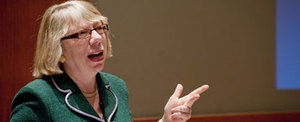Calvert Funds chief sees ‘explosion of interest’ in social investing
Published: February 3, 2011 / Author: Ed Cohen

The offices of the Calvert Social Investment Fund started receiving some unexpected inquiries a few years back, Barbara J. Krumsiek, CEO and president of Calvert Group, Ltd., told an audience at the University of Notre Dame on Jan. 28, 2011.
She said companies that didn’t pass muster under the fund’s high standards for corporate values and behavior –Wal-Mart and Waste Management among them – had started contacting Calvert. The companies wanted to meet with the fund’s analysts, hear how they assessed the companies, and learn more about why the fund wouldn’t invest in them, she said.
“I said, ‘This looks like a new trend. This never used to happen.’”
To Krumsiek, a proponent of socially responsible investing or SRI, it was further evidence that SRI is nearing a tipping point, from niche market for the kind-hearted to the financial mainstream.
“Things are changing, It’s just been an explosion of interest,” she said, before quickly adding, “of interest, not dollars yet….”
Krumsiek said that in the most recent year, social or sustainable investing grew 380 percent, but the segment still amounts to just $3 billion of the $25 trillion in total assets under management. Still, she’s heartened by the number of companies that want to be categorized as socially responsible.
In response to the inquiries from excluded companies, Krumsiek said Calvert launched an initiative called SAGE for Sustainability Achieved through Greater Engagement. Understanding that major stockholders are more likely to be listened to by management, the Calvert Large Cap Value Fund invested in 20 companies that didn’t qualify as socially responsible under Calvert’s usual screens. Krumsiek said the idea was to talk with and, hopefully, convince these companies to change their ways. Of the 20 companies, Calvert now has “high-level engagement” with 16, she said.
Krumsiek’s appearance at Notre Dame was part of the Ten Years Hence speaker series of Notre Dame’s Mendoza College of Business, which explores issues, ideas and trends likely to affect business and society over the next decade. Krumsiek titled her talk “The Evolution of Sustainable Investing: From Individual Conscience to Institutional Accountability.”
She pointed out that in 1982 Calvert became the first mutual fund to declare it would not invest in companies doing business in South Africa. The divestment movement added to international efforts to convince South Africa to abandon its apartheid system of racial segregation. Krumsiek, who joined Calvert as CEO in 1997, said that during a state visit in 2002, the wife of the country’s second post-apartheid president, Thabo Mbeki, visited Calvert’s offices to express her gratitude.
“[T]his was one of Calvert’s first sort of attempts to affect global public policy through social investing in a way that we thought was actually good for business and certainly good for society,” she said.
The Calvert CEO is an advocate for greater diversity in corporate management and governance, and under her leadership Calvert has issued model language to help company boards of directors interview more diverse pools of candidates. The company also created the Calvert Women’s Principles, described as a set of tools to help investors assess corporate progress on gender equality.
“And why did we do all this? Not just because it’s a nice thing to do.” She said that having a diverse set of viewpoints in the room helps directors make better decisions.
“Diverse boards look more critically at corporate strategies … they’re not as likely to go along with questionable practices just because everybody’s doing it and that’s the way it’s always been done.”
As evidence that diversity pays, Krumsiek cited a 2007 study that found that from 2001 and 2004 the Fortune 500 companies with the most women directors averaged 42 percent more pre-tax net income per dollar of revenue than the companies with the fewest female directors. The same companies had a 53 percent higher return on stockholder equity and a 66 percent higher return on invested capital, she said.
The Ten Years Hence series is sponsored by the O’Brien-Smith Leadership Program, made possible by a generous endowment from William H. O’Brien (ND ’40) and his wife, Dee. The O’Brien-Smith Program endowment provides an opportunity for students and faculty to interact with distinguished leaders from business, government and nonprofit sectors.
/news_and_events/news_articles/article/8294/calvert-funds-chief-sees-explosion-of-interest-in-social-investing




